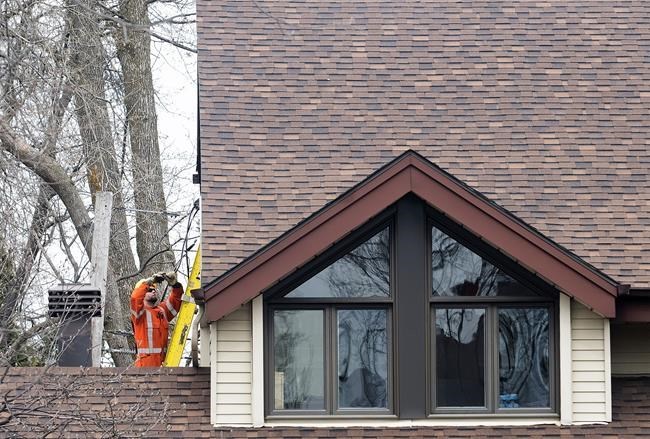MONTREAL — Quebec's power utility said Tuesday it was working to fix the most complicated damage after last week's devastating ice storm but couldn't put a timetable on when everyone would have power back.
On Tuesday morning, about 16,000 customers were off the grid, and by early afternoon the number had dropped below 12,000, though there were some fluctuations. About half of those still in the dark were in Montreal.
Hydro-Québec spokesman Francis Labbé said the remaining work is particularly complex. The common issue is that power lines have been damaged by mature trees, and branches need to be cleared before crews can conduct repairs, he said.
Much of the damage is in private backyards, and sometimes the extent of the damage isn't always apparent even after the repair, which is why the numbers are in flux. The total number of incidents causing outages dropped from 500 earlier Tuesday to less than 300 by the afternoon.
"There's a complexity to all this, so that it's hard to say exactly how long some of these people who are still without power may end up having to wait," Labbé said.
"The damage that we are confronted with in the remaining outages is often major, and we sometimes have to use two to three teams to restore an outage that will take hours to repair but that will only bring back five to 10 customers at a time."
Hydro-Québec said Tuesday it has restored power to 99 per cent of the 1.1 million customers who lost electricity after freezing rain split tree trunks and sent branches crashing onto power lines last Wednesday.
Apart from Montreal, other areas dealing with outages include the greater Gatineau area and Pontiac region in western Quebec and Laval, north of Montreal.
Labbé said crews are focusing on those areas where the power has been out the longest. He says about 1,500 people, including Hydro-Québec employees and contractors, are on the job.
In Beaconsfield, a suburb on Montreal's West Island, about 500 homes were without power for a sixth day on Tuesday, and the mayor said some might only see their power return on Wednesday — one week after the storm.
Mayor Georges Bourelle said crews were at work replacing poles and transformers as needed, but felt the plan to complete the work by Tuesday evening was a bit optimistic.
"It could be an extra day before everything is done," Bourelle said. "I know that some have been reconnected since this morning, so they are definitely working very, very hard to get it done."
But Bourelle said six days without electricity is unacceptable, and people are angered and frustrated. This year's weather event, like the ice storm that hit Quebec in 1998, should serve as a wake-up call, he said.
"With climate change, we will probably see extreme weather happening much more often than in the past," Bourelle said. "It's time that we review the distribution model of Hydro-Québec, and I think it may be economically viable to start putting some of the lines in the ground."
In Montreal, officials said the city would be transitioning into "recovery mode" and would be closing emergency shelters opened last week. Fire Chief Richard Liebmann said anyone still missing power and needing assistance would be taken care of individually.
Alain Vaillancourt, the executive committee member responsible for public security, said most streets have been cleared of branches and now city crews will turns their attention to parks. Vaillancourt said the city intends to replant the trees that were felled by the storm.
This report by The Canadian Press was first published April 11, 2023.
— With files from Pierre St-Arnaud.
Sidhartha Banerjee, The Canadian Press




